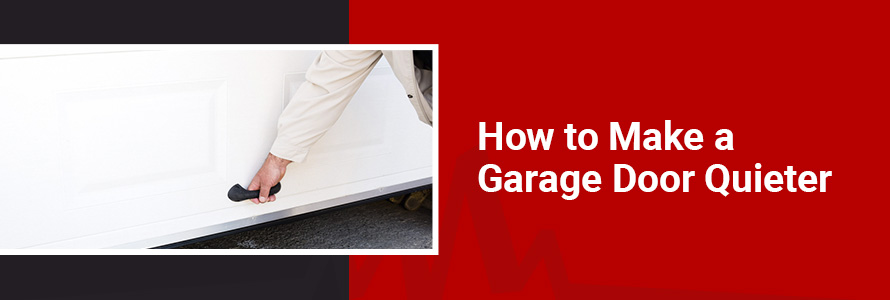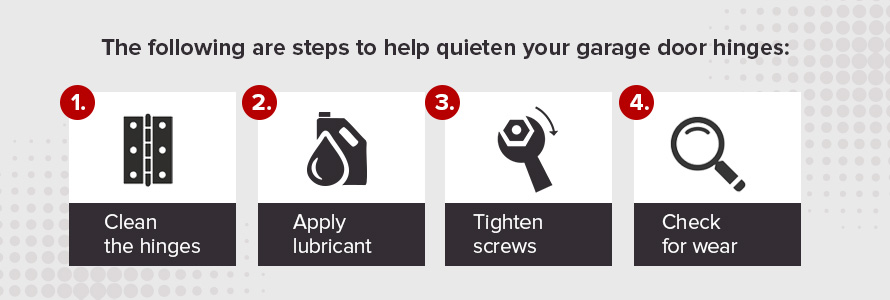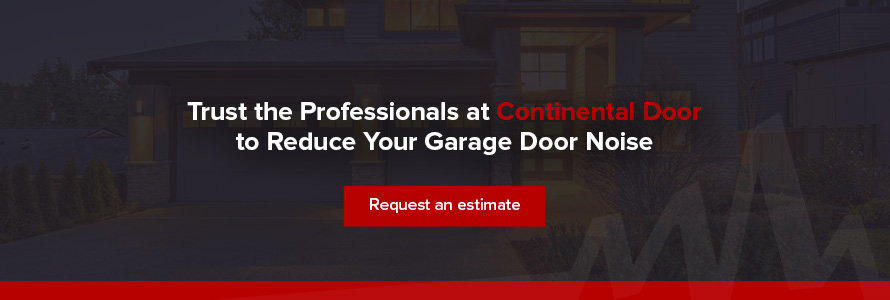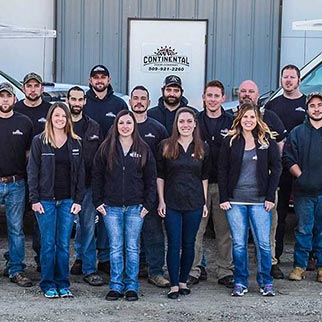
As a homeowner or business owner, you want your garage door to operate smoothly and quietly. However, sometimes garage doors can make disturbing noises — thankfully, there are ways to resolve these issues with at-home solutions and professional help.
Common Garage Door Noises
Understanding and identifying the noise source is the first step to knowing how to make a garage door quieter. Some of the most likely culprits for your garage door’s noise include:
- Loose hardware
- Worn-out rollers
- Unbalanced door
- Lack of lubrication
- Faulty garage door opener
- Damaged tracks
- Old or worn-out springs
Identifying the Cause of the Noise
To identify the source of your garage door’s noise, follow these steps:
- Visual inspection: Examine the door’s hardware, rollers, tracks and springs for any visible signs of wear or damage.
- Audible inspection: Operate the door and listen for specific noises such as squeaking, grinding or banging. Try to pinpoint where the sound is coming from.
- Manual operation: Disconnect the opener and manually open and close the door to see if the noise persists. If it doesn’t, the issue is with the opener.
- Balance check: Test the door’s balance by opening it halfway and stopping. It may be unbalanced if both sides do not stay in place immediately.
5 Tips on How to Make Your Garage Door Quieter
There are several ways to make your garage door quieter, and the tips you need likely depend on your issue. It may be a case of implementing preventive maintenance or requiring an upgrade. The following are five tips for making your garage door quieter.
1. Taking Preventive Measures and Doing Maintenance
You can do routine garage door maintenance yourself. However, it is typically advisable to contact a professional to work through the following checklist:
- Inspect hardware: Regularly check and tighten all nuts, bolts and screws to prevent them from coming loose and to stop any rattling or vibrating.
- Clean tracks: Remove dirt and debris from the tracks to ensure the door operates smoothly.
- Examine rollers: Inspect rollers for wear and replace them if necessary, especially metal ones.
- Test the auto-reverse: To ensure the safety of people and objects, ensure the auto-reverse feature is functioning correctly.
- Inspect the weatherstripping: Check and replace weatherstripping to keep out dirt, prevent drafts and reduce noise.
2. Implementing Proper Lubrication
Proper lubrication is crucial to maintaining a quiet and smoothly operating garage door. It assists in reducing friction, prevents wear and tear and minimizes noise. Regular lubrication extends the life span of the door’s various moving components and ensures efficient operation.
You’ll want to apply a high-quality lubricant to rollers, hinges, tracks and springs to reduce friction and noise.
3. Ensuring Quiet Garage Door Hinges
Hinges on a garage door can produce noise due to friction between metal components, lack of lubrication or general wear and tear over time. Additionally, rust and dirt accumulation can contribute to squeaking or grinding sounds.
The following are steps to help quieten your garage door hinges:
- Clean the hinges: Remove any dirt, dust or rust from the hinges using a cloth or small non-abrasive brush. Rust removal may require adding a protective layer afterward or replacing the hinges.
- Apply lubricant: Use a silicone-based spray or white lithium grease to lubricate the hinges’ pivot points every few months.
- Tighten screws: It is crucial to ensure all screws and bolts are securely tightened to prevent rattling or the hinges from coming loose.
- Check for wear: Inspect the hinges for signs of wear, damage or excessive rust and replace them if necessary.
4. Insulating a Garage Door to Make It Quieter
Insulation is another way to make your garage doors quieter, as it reduces noise and improves energy efficiency, making your garage more comfortable and cost-effective.
The benefits of insulating your garage door include:
- Noise reduction: Insulation helps dampen the sound of your garage door opening and closing and muffles external sounds, too.
- Energy efficiency: Insulated doors assist with maintaining a stable temperature inside the garage door, ultimately reducing heating and cooling costs.
- Enhanced durability: Most insulation adds strength to the door, making it more resistant to excessive damage from dents and other harm.
- Improved comfort: If you work in your garage, a well-insulated door makes it more comfortable, especially in extreme weather conditions.
- Increased home value: Upgrades like this can boost your home’s market value as an added benefit, should you wish to sell eventually.
There are various types of insulation materials available, which you can speak to a professional about, and these are:
- Foam board: These rigid panels provide excellent thermal resistance and are easy to install.
- Reflective insulation: This consists of reflective foil that reduces heat transfer and is ideal for warm or hot climates.
- Spray foam: It expands to fill gaps and provides a high R-value, offering superior insulation.
- Fiberglass batts: These are a more traditional insulation material that is highly effective and widely available.
- Polystyrene panels: This is a good choice if you want a lightweight, moisture-resistant option with good insulation properties.
5. Making Strategic Upgrades to Quieter Components
Upgrading your garage door to noise-reducing hardware can significantly enhance its quietness and performance. Here are some considerations when making upgrades to quieter components:
- Noise-reducing hardware options: Consider installing nylon rollers and rubber belt drives for a quieter solution. Nylon rollers are quieter than metal ones, and rubber belt drives reduce vibrations and noise compared to chain drives.
- Benefits of nylon rollers: Nylon rollers offer smoother and quieter operation than metal rollers, and they reduce friction and wear. This leads to less noise and longer-lasting performance.
- Investing in high-quality models: Opting for high-quality, quiet garage door models can provide long-term peace of mind. These models are designed with noise reduction in mind to ensure a quieter and more efficient operation.
- Cost-benefit evaluation: While the initial investment in noise-reducing components may be higher, the long-term benefits include reduced maintenance costs, improved performance and a quieter garage door.
When to Consider Professional Installation for Maximum Quietness
If your garage door continues to make persistent noise despite regular maintenance and attempted do-it-yourself (DIY) fixes, consider contacting a professional. Signs that a professional is needed include:
- Unusual grinding or banging sounds
- Difficulty in balancing the door
- Visible wear and tear on critical components
- Persistent and irregular noise despite your attempts
Professional garage door and component installers have the expertise to diagnose and address complex issues, ensuring optimal performance and quiet operation of your door. They can also recommend and install high-quality, noise-reducing components, providing long-term solutions. Additionally, professional installation often comes with warranties, which helps to ensure your investment is protected.
Trust the Professionals at Continental Door to Reduce Your Garage Door Noise

If you are in the greater Spokane and north Idaho area and need help reducing or eliminating the noise from your garage door, please ask for professional assistance from Continental Door. We provide a range of services and repair options, as well as residential garage door products and commercial garage door solutions, with offerings sure to meet your needs.
Please contact us online for a free quote, general questions, or to ask about our offerings. We will use our years of service history and knowledge to help you.



